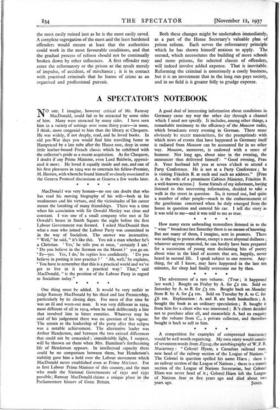One thing must be added. It would be very unfair
to judge Ramsay MacDonald by his third and last Premiership, particularly by its closing days. For most of that time he was an ill and worn-out man. It was very different in 1924, most different of all in 1914, when he took deliberately a line that involved him in bitter enmities. Whatever may be said of his judgement there was no question of his vigour. The return to the leadership of the party after that eclipse was a notable achievement. The alternative leader was Arthur Henderson, and between the two existed differences that could not be concealed ; considerable light, I suspect, will be thrown on them when Mrs. Hamilton's forthcoming life of Henderson appears. In intellectual capacity there could be no comparison between them, but Henderson's stability gave him a hold over the Labour movement which MacDonald never established even as Prime Mir. ister. But as first Labour Prime Minister of this country, and the man who made the National Governments of 1931 and 1932 possible, Ramsay MacDonald claims a unique place in the Parliamentary history of Great Britain.














































 Previous page
Previous page